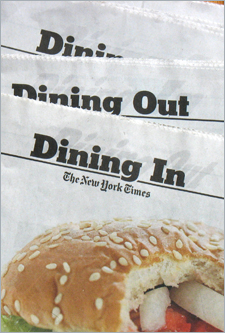 First, let’s be painfully honest here. Part of the joy of cooking is the ooohs and ahhhs our efforts produce in others when we do it right. It just is. But going through a backlog of New York Times food sections the other day, I came across an amusingly disturbing [or perhaps disturbingly amusing] article that got me thinking about achieving a balance between food as showmanship and food as, well, food: Dinner at the Foodies’: Purslane and Anxiety.
First, let’s be painfully honest here. Part of the joy of cooking is the ooohs and ahhhs our efforts produce in others when we do it right. It just is. But going through a backlog of New York Times food sections the other day, I came across an amusingly disturbing [or perhaps disturbingly amusing] article that got me thinking about achieving a balance between food as showmanship and food as, well, food: Dinner at the Foodies’: Purslane and Anxiety.
The thrust of the article is summed up beautifully by a history professor who lives in Harlem and admits to being both a victim and propagator of culinary anxiety: “It becomes less about having people over and more about showing off your foodie credentials.” The lengths some home cooks go to to impress their guests are appallingly detailed in the article. It’s a good read, so I won’t spoil it for you here [other than to say one story involves a divorce in progress].
But in the end, cooking for others isn’t about showing off [well, okay, maybe it is a little]. It is about having people over. Yes, we work hard [or at least try to give the impression of having done so] to create delicious, exciting meals. And yes, there is a certain amount of performance anxiety inherent in entertaining, especially as things come together at the last minute—if there isn’t, you’re probably being lazy or complacent. These are your friends, your family. You want them to feel welcomed and well fed—to feel that they’re part of a special moment. Once you reach a certain level of goodness, though, you have to ask yourself if you’re cooking for your guests or merely for their accolades.
As a bit of perspective, not all that long ago in polite society, complimenting your host or hostess on the meal was considered rude. It was assumed that the help had prepared it, and it was expected to be very good. Otherwise, the help would be seeking opportunities elsewhere.
Personally, I’m just as glad to not be living back then [and besides, I would have probably been the help, not the host, and not even very high up that food chain]. I do like to hear how delicious everything is, best of all in the form of a delighted moan from a mouth still full of the first bite. I just also like to hear about a new movie, book, band or art exhibit. And about someone’s vacation plans, job, kids or take on alternate side of the street parking. You know, conversation.
So how do you achieve that balance of serving wonderful, memorable food without letting the food take over the entire evening? A couple of guidelines. First, when putting together a meal or a party stops being fun for you, it’s probably no longer fun for your guests.
If, on the other hand, on the way out the door at the end of the evening, a guest turns to you and utters a heartfelt, “Everything was wonderful!”, you’ll know it was—and not just the food.
Leave a comment